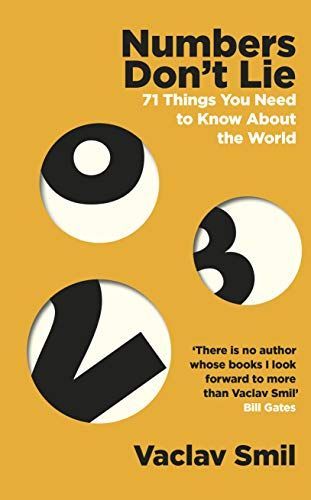
Numbers Don't Lie
'There is no author whose books I look forward to more than Vaclav Smil' Bill Gates Is flying dangerous? How much do the world's cows weigh? And what makes people happy? From earth's nations and inhabitants, through the fuels and foods that energize them, to the transportation and inventions of our modern world - and how all of this affects the planet itself - in Numbers Don't Lie, Professor Vaclav Smil takes us on a fact-finding adventure, using surprising statistics and illuminating graphs to challenge lazy thinking. Packed with 'Well-I-never-knew-that' information and with fascinating and unusual examples throughout, we find out how many people it took to build the Great Pyramid, that vaccination yields the best return on investment, and why electric cars aren't as great as we think (yet). There's a wonderful mix of science, history and wit, all in bite-sized chapters on a broad range of topics. Urgent and essential, Numbers Don't Lie inspires readers to interrogate what they take to be true in these significant times. Smil is on a mission to make facts matter, because after all, numbers may not lie, but which truth do they convey? 'The best book to read to better understand our world. Once in a while a book comes along that helps us see our planet more clearly. By showing us numbers about science, health, green technology and more, Smil's book does just that. It should be on every bookshelf!' Linda Yueh, author of The Great Economists 'He is rigorously numeric, using data to illuminate every topic he writes about. The word "polymath" was invented to describe people like him' Bill Gates 'Important' Mark Zuckerberg, on Energy 'One of the world's foremost thinkers on development history and a master of statistical analysis . . . The nerd's nerd' Guardian 'There is perhaps no other academic who paints pictures with numbers like Smil' Guardian 'In a world of specialized intellectuals, Smil is an ambitious and astonishing polymath who swings for fences . . . They're among the most data-heavy books you'll find, with a remarkable way of framing basic facts' Wired 'He's a slayer of bullshit' David Keith, Gordon McKay Professor of Applied Physics & Professor of Public Policy, Harvard University Vaclav Smil is Distinguished Professor Emeritus at the University of Manitoba. He is the author of over forty books on topics including energy, environmental and population change, food production and nutrition, technical innovation, risk assessment and public policy. No other living scientist has had more books (on a wide variety of topics) reviewed in Nature. A Fellow of the Royal Society of Canada, in 2010 he was named by Foreign Policy as one of the Top 100 Global Thinkers. This is his first book for a more general readership.
Reviews
Marcy Pursell @mpursell21
Bouke van der Bijl@bouk
Lord Aragorn@lordaragorn
Nick Gracilla@ngracilla
Fadi@homs_dream
Kuba Milcarz@kubamilcarz
Vivian@vivian_munich
Vivian@vivian_munich
Josue Gonzalez@josue
Hooman Rostami@hooman
Rob@robcesq
Zack Apira@vatthikorn
Jenelle andersen@jenelle
Jimmy Cerone@jrcii
Keven Wang@kevenwang
Sapan Parikh@sapan
Dana Paduraru@danuta
Sarah Hamilton@sarahh9
Howard Lo@talk19